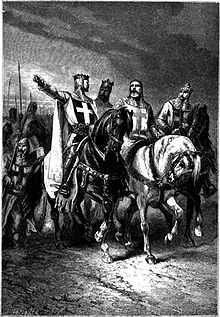Hugh I, Count of Vermandois
| Hugh I of Vermandois | |
|---|---|
|
Hugh I of Vermandois | |
| Spouse(s) | Adelaide, Countess of Vermandois |
| Noble family | House of Capet |
| Father | Henry I of France |
| Mother | Anne of Kiev |
| Born | 1057 |
| Died |
18 October 1101 Tarsus |
| French Monarchy |
|---|
| Direct Capetians |
.svg.png) |
| Henry I |
| Philip I |
| Hugh, Count of Vermandois |

Hugh I of Vermandois (1057 – October 18, 1101),[1] called Magnus or the Great, was a younger son of Henry I of France and Anne of Kiev and younger brother of Philip I. He was in effect Count of Vermandois, but an ineffectual leader and soldier, great only in his boasting. Indeed, Steven Runciman is certain that his nickname Magnus (greater or elder), applied to him by William of Tyre, is a copyist's error, and should be Minus (younger), referring to Hugh as younger brother of the King of France.[2]
In early 1096 Hugh and Philip began discussing the First Crusade after news of the Council of Clermont reached them in Paris. Although Philip could not participate, as he had been excommunicated, Hugh was said to have been influenced to join the Crusade after an eclipse of the moon on February 11, 1096.
That summer Hugh's army left France for Italy, where they would cross the Adriatic Sea into territory of the Byzantine Empire, unlike the other Crusader armies who were travelling by land. On the way, many of the soldiers led by fellow Crusader Emicho joined Hugh's army after Emicho was defeated by the Hungarians, whose land he had been pillaging. Hugh crossed the Adriatic from Bari in Southern Italy, but many of his ships were destroyed in a storm off the Byzantine port of Dyrrhachium.
Hugh and most of his army were rescued and escorted to Constantinople, where they arrived in November 1096. Prior to his arrival, Hugh allegedly sent an arrogant, insulting letter to Eastern Roman Emperor Alexius I Comnenus. According to the Emperor's biography written by his daughter Anna Comnena (the Alexiad), he demanded that Alexius meet with him:
- "Know, O King, that I am King of Kings, and superior to all, who are under the sky. You are now permitted to greet me, on my arrival, and to receive me with magnificence, as befits my nobility."[3]
Alexius was already wary of the armies about to arrive, after the unruly mob led by Peter the Hermit had passed through earlier in the year. Alexius kept Hugh in custody in a monastery until Hugh swore an oath of vassalage to him.
After the Crusaders had successfully made their way across Seljuk territory and, in 1098, captured Antioch, Hugh was sent back to Constantinople to appeal for reinforcements from Alexius. Alexius was uninterested,[4] however, and Hugh, instead of returning to Antioch to help plan the siege of Jerusalem, went back to France. There he was scorned for not having fulfilled his vow as a Crusader to complete a pilgrimage to Jerusalem, and Pope Paschal II threatened to excommunicate him. He joined the minor Crusade of 1101, but was wounded in battle with the Turks in September, and died of his wounds in October in Tarsus.
Family and children
He married Adelaide of Vermandois, the daughter of Herbert IV, Count of Vermandois and Alice, Countess of Valois. They had nine children:
- Mathilde, married Raoul I of Beaugency
- Elizabeth of Vermandois, Countess of Leicester (d. 1131)
- Beatrice (living 1144), married Hugh III of Gournay
- Ralph I (d. 1152)
- Constance (date of death unknown), married Godfrey de la Ferté-Gaucher
- Agnes (living 1125), married Boniface del Vasto
- Henry (d 1130), seigneur of Chaumont en Vexin
- Simon (d 1148)
- William (d.c. 1096)
Ancestry
| Ancestors of Hugh I, Count of Vermandois | |||||||||||||||||||||||||||||||||||||||||||||||||||||||||||||||||||||||||||||||||||||||||||||||||||||||||||||||||||||||||||||||||||||||||||||||||||||||||||||||||||||||||||||||||||||||||||||||||||||||||||||||||||||||||||||||||||||||||||||||||||||||||||||||||||||||||||||||||||||||||||||||||||||||||||||||||||||||||||||||||||||||||||||||||||||||||||||||||||||||||||||||||||||||||||||||||||||||||||||||||||||||||||||||||||||||||||||||||||||||||||||||||||||||||||||||||||||||||||||||||
|---|---|---|---|---|---|---|---|---|---|---|---|---|---|---|---|---|---|---|---|---|---|---|---|---|---|---|---|---|---|---|---|---|---|---|---|---|---|---|---|---|---|---|---|---|---|---|---|---|---|---|---|---|---|---|---|---|---|---|---|---|---|---|---|---|---|---|---|---|---|---|---|---|---|---|---|---|---|---|---|---|---|---|---|---|---|---|---|---|---|---|---|---|---|---|---|---|---|---|---|---|---|---|---|---|---|---|---|---|---|---|---|---|---|---|---|---|---|---|---|---|---|---|---|---|---|---|---|---|---|---|---|---|---|---|---|---|---|---|---|---|---|---|---|---|---|---|---|---|---|---|---|---|---|---|---|---|---|---|---|---|---|---|---|---|---|---|---|---|---|---|---|---|---|---|---|---|---|---|---|---|---|---|---|---|---|---|---|---|---|---|---|---|---|---|---|---|---|---|---|---|---|---|---|---|---|---|---|---|---|---|---|---|---|---|---|---|---|---|---|---|---|---|---|---|---|---|---|---|---|---|---|---|---|---|---|---|---|---|---|---|---|---|---|---|---|---|---|---|---|---|---|---|---|---|---|---|---|---|---|---|---|---|---|---|---|---|---|---|---|---|---|---|---|---|---|---|---|---|---|---|---|---|---|---|---|---|---|---|---|---|---|---|---|---|---|---|---|---|---|---|---|---|---|---|---|---|---|---|---|---|---|---|---|---|---|---|---|---|---|---|---|---|---|---|---|---|---|---|---|---|---|---|---|---|---|---|---|---|---|---|---|---|---|---|---|---|---|---|---|---|---|---|---|---|---|---|---|---|---|---|---|---|---|---|---|---|---|---|---|---|---|---|---|---|---|---|---|---|---|---|---|---|---|---|---|---|---|---|---|---|---|---|---|---|---|---|---|---|---|---|---|---|---|---|---|---|---|---|---|---|---|---|---|---|---|---|---|---|---|---|---|---|---|---|---|---|---|---|---|---|---|---|---|---|---|---|---|---|---|---|---|---|---|---|---|---|---|---|---|---|---|---|---|---|---|---|---|---|---|---|---|---|---|---|---|---|---|---|---|---|---|---|---|---|---|---|---|---|---|---|---|
| |||||||||||||||||||||||||||||||||||||||||||||||||||||||||||||||||||||||||||||||||||||||||||||||||||||||||||||||||||||||||||||||||||||||||||||||||||||||||||||||||||||||||||||||||||||||||||||||||||||||||||||||||||||||||||||||||||||||||||||||||||||||||||||||||||||||||||||||||||||||||||||||||||||||||||||||||||||||||||||||||||||||||||||||||||||||||||||||||||||||||||||||||||||||||||||||||||||||||||||||||||||||||||||||||||||||||||||||||||||||||||||||||||||||||||||||||||||||||||||||||
References
- ↑ G.E. Cokayne; with Vicary Gibbs, H.A. Doubleday, Geoffrey H. White, Duncan Warrand and Lord Howard de Walden, editors, The Complete Peerage of England, Scotland, Ireland, Great Britain and the United Kingdom, Extant, Extinct or Dormant, new ed., 13 volumes in 14 (1910-1959; reprint in 6 volumes, Gloucester, U.K.: Alan Sutton Publishing, 2000), volume VII, page 526.
- ↑ Is this reference to Runciman correct? "Hugo minus" is bad Latin ("Hugo minor" would be the right form), and William of Tyre is not the source of the title. Rosalind Hill traces the error to the anonymous Gesta Francorum, and explains it as a confusion with the old French "maisné" (younger brother) (R. Hill and R. A. B. Mynors (eds), 'Gesta Francorum et aliorum Hierosolimitanorum, 1962, London, xi-xii).
- ↑ http://en.wikisource.org/wiki/The_Alexiad/Book_X chapter VII
- ↑ In "Urban's Crusade--Success or Failure" (Key, 1948) it is argued, indeed to the contrary, that the emperor was disturbed by Hugh's report and the disquieting rumors emitting from Antioch (on Bohemond's intent and conduct) and promptly set out to prepare another expedition: "...Alexius immediately began preparations for another expedition, and he furthermore sent envoys to the crusaders to announce its coming."
| Hugh I, Count of Vermandois Born: 1057 Died: 18 October 1101 | ||
| French nobility | ||
|---|---|---|
| Preceded by Odo |
Count of Vermandois with Adelaide 1085–1101 |
Succeeded by Ralph I |
